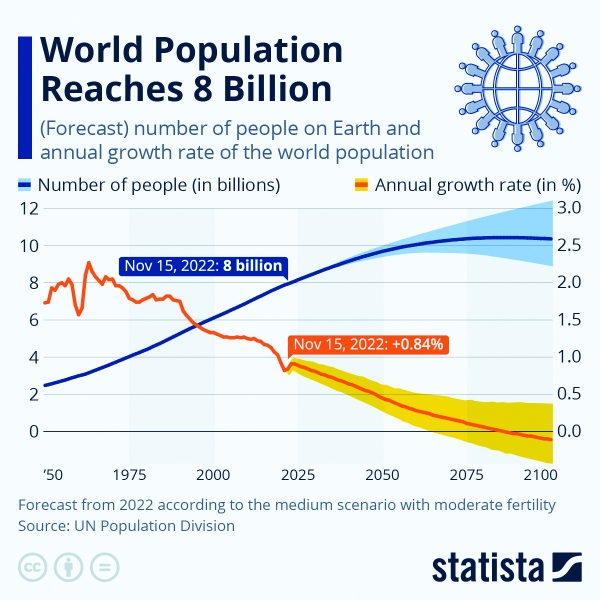
Among many keywords that describe the year 2022, runaway climate change and a planet of 8 billion can be thought of as one of the most symbolic events. There have been and still are numerous reports suggesting the Earth is quickly approaching the tipping point, and, as the global population soared above 8 billion this November, the hours on the climate clock are ticking exponentially faster. Overpopulation is the elephant in the room of climate change but one that is often considered taboo. Secretary-General António Guterres, with regard to the population reaching 8 billion, said “[it is] an occasion to celebrate diversity and advancements while considering humanity’s shared responsibility for the planet.” Although true, the simple math is that more people directly equate to a larger ecological footprint.
Explaining the severity of climate change is often characterized by the use of strong adjectives and rhetoric. As much as this could be an effective emotional appeal, it gives off a vague impression about the actual reality and hence fails to convey its severity altogether. As unusual weather events become more frequent not only to regions that were previously known to be the most vulnerable but to all regions of the globe, people are experiencing the direct outcomes of climate change at hand; consequently, the use of strong rhetoric is sadly becoming less important.
The Russian invasion of Ukraine is also another defining event with profound implications for the global economy, and international political dynamics, and a potential gateway to World War III. Numerous war crimes by Russian soldiers and authorities such as, but not only, deliberate attacks on civilian targets, rape and abduction against women and children have been reported to the global community. Followed by several sanctions imposed on Russia, European countries that depended on their natural gas import from them have faced an energy crisis and a record-high inflation rate.
Amidst all these upheavals and chaos that seem to swallow the world as a whole, 2022 can also be marked as a year of South Korea’s great leap forward in space exploration. The first domestically designed and manufactured Nuri rocket completed its launch on the 21st of June which is a testament to Korea’s aerospace technology and advanced economy. Korea has now become the seventh country in the world to have the technology to launch a space vehicle capable of carrying a 1-ton payload. This triumph came after a decade of research and investment of 2 trillion KRW since Korea’s rocket launch failure in 2009. The country aims to launch another rocket by 2027 and its independent lunar mission by 2031.


